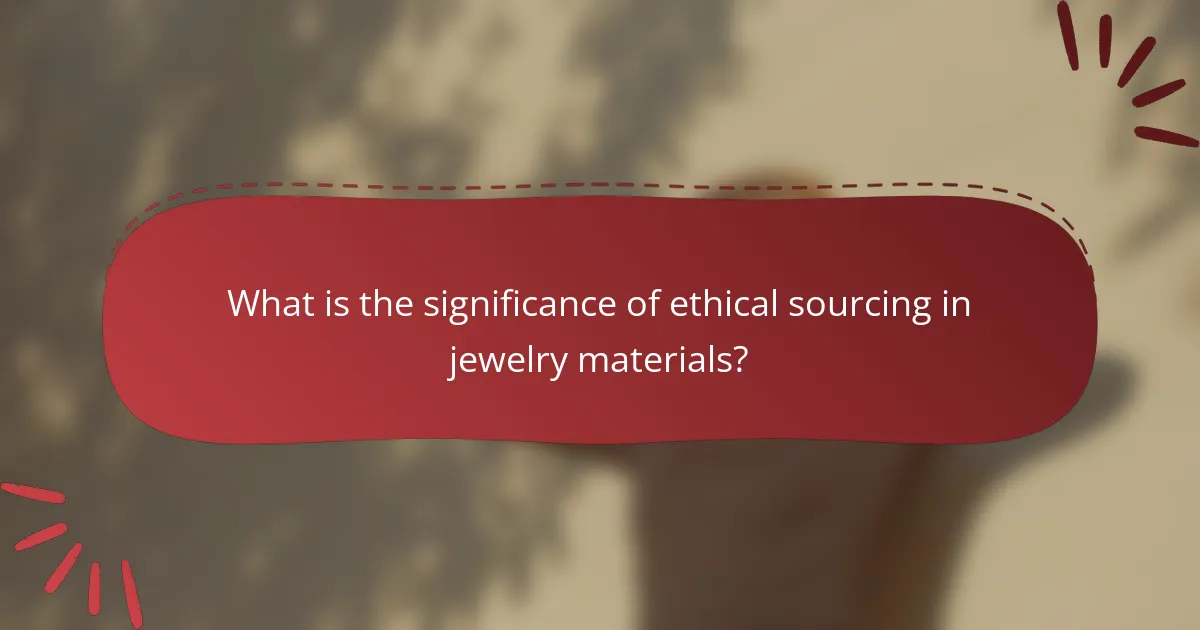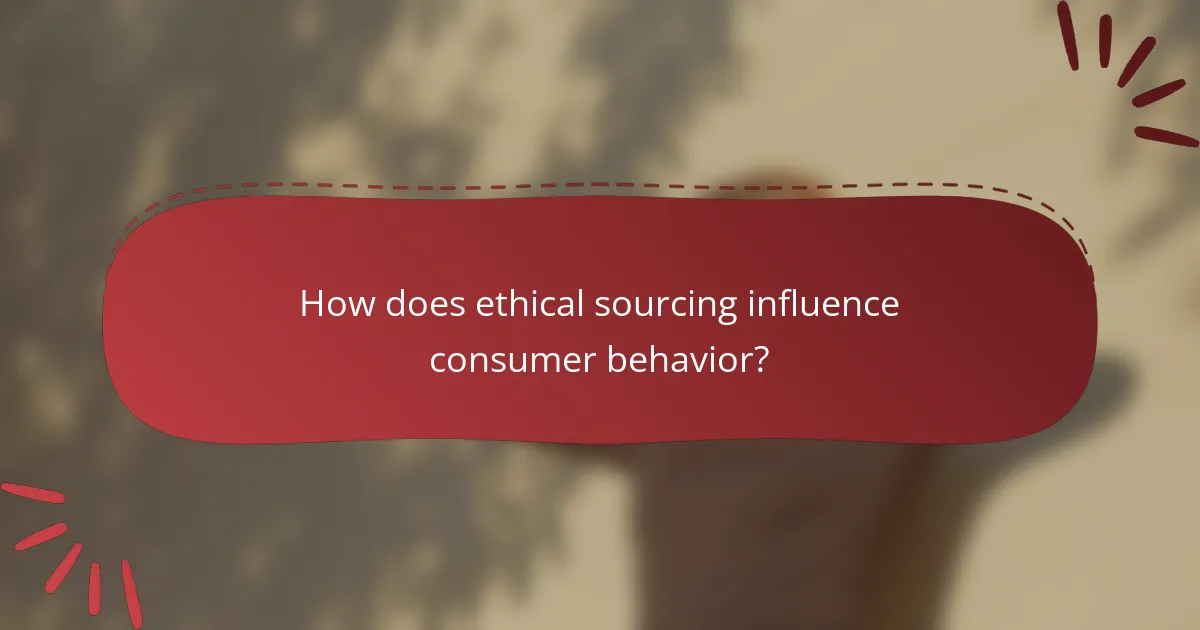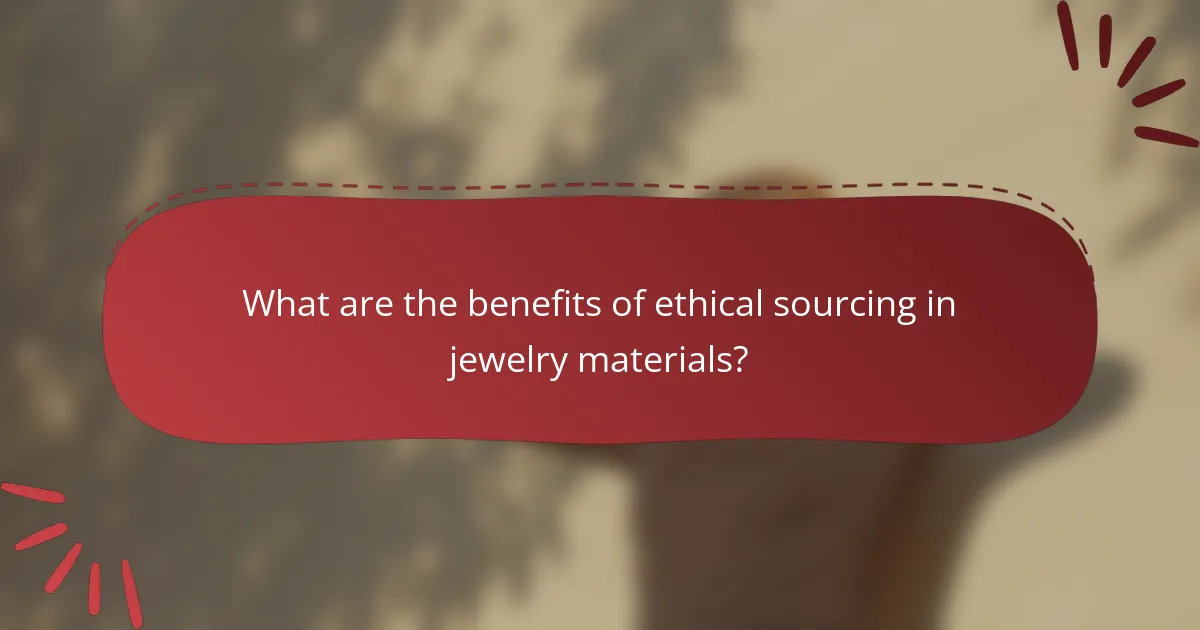Ethical sourcing in jewelry materials refers to the responsible acquisition of gemstones and metals, prioritizing environmental sustainability and fair labor practices. This approach addresses human rights abuses, such as child labor and exploitation, while promoting transparency within the supply chain. Recent consumer trends indicate a strong preference for ethically sourced products, with 70% of consumers favoring brands that demonstrate ethical practices. Ethical sourcing not only enhances brand reputation but also fosters consumer trust and loyalty, as 66% of global consumers are willing to pay more for sustainably produced goods. By aligning with these values, jewelers can differentiate themselves and contribute to community development through responsible practices.

What is the significance of ethical sourcing in jewelry materials?
Ethical sourcing in jewelry materials ensures that gemstones and metals are obtained responsibly. This practice protects the environment and supports fair labor conditions. It helps prevent human rights abuses, including child labor and exploitation. Ethical sourcing also promotes transparency in the supply chain. Consumers increasingly demand ethically sourced products, influencing market trends. According to a 2021 survey by the Gemological Institute of America, 70% of consumers prefer brands that demonstrate ethical practices. This shift encourages jewelers to adopt sustainable sourcing methods. Ultimately, ethical sourcing enhances brand reputation and fosters consumer trust.
Why is ethical sourcing important in the jewelry industry?
Ethical sourcing is crucial in the jewelry industry to ensure that materials are obtained responsibly. This practice helps prevent human rights abuses, such as child labor and exploitation in mining. Ethical sourcing also supports environmental sustainability by promoting eco-friendly extraction methods. According to the Responsible Jewelry Council, ethical sourcing enhances consumer trust and brand reputation. Consumers increasingly prefer brands that prioritize ethical practices. In fact, a 2021 survey found that 66% of consumers are willing to pay more for sustainable products. Therefore, ethical sourcing not only aligns with moral values but also drives market demand.
What are the core principles of ethical sourcing?
The core principles of ethical sourcing include transparency, sustainability, and fair labor practices. Transparency ensures that companies disclose their supply chains and sourcing methods. Sustainability focuses on minimizing environmental impact and promoting resource conservation. Fair labor practices advocate for safe working conditions and equitable wages for workers. These principles are essential in promoting responsible sourcing in industries, including jewelry. For example, the Responsible Jewelry Council sets standards for ethical sourcing practices within the jewelry sector.
How does ethical sourcing impact the environment?
Ethical sourcing significantly reduces environmental degradation. It promotes sustainable practices that minimize resource depletion. For example, ethical sourcing often involves using recycled materials. This reduces the demand for new raw materials, preserving ecosystems. Additionally, it encourages responsible mining practices. These practices help to prevent pollution and habitat destruction. A study by the World Gold Council found that responsible mining can reduce carbon emissions by up to 30%. Overall, ethical sourcing fosters a healthier planet by prioritizing environmental stewardship.
What are the key challenges associated with ethical sourcing in jewelry materials?
Key challenges associated with ethical sourcing in jewelry materials include traceability, supply chain transparency, and labor exploitation. Traceability is often difficult due to complex supply chains. Many materials pass through multiple hands before reaching the final product. This obscures the origin of the materials used. Supply chain transparency is hindered by a lack of standardized reporting practices. Companies may not disclose their sourcing practices fully. Labor exploitation remains a significant issue, particularly in developing countries. Reports indicate that workers often face unsafe conditions and unfair wages. Additionally, certification processes for ethical sourcing can be inconsistent. This inconsistency creates confusion for consumers seeking ethically sourced products.
What are the common unethical practices in jewelry sourcing?
Common unethical practices in jewelry sourcing include child labor, exploitation of workers, and environmental degradation. Child labor occurs when minors are employed in dangerous mining conditions. Exploitation of workers involves low wages and poor working conditions. Environmental degradation results from irresponsible mining practices that harm ecosystems. Additionally, conflict minerals may finance violence and human rights abuses. The jewelry industry often lacks transparency, making it difficult to trace the origins of materials. These practices contribute to significant ethical concerns within the industry.
How can consumers identify ethically sourced jewelry?
Consumers can identify ethically sourced jewelry by looking for certifications from recognized organizations. Certifications like Fair Trade, Responsible Jewelry Council, and Kimberley Process indicate ethical sourcing practices. Additionally, consumers should inquire about the supply chain and sourcing practices of the brand. Transparent brands often provide detailed information about where and how their materials are sourced. Research shows that nearly 70% of consumers prefer brands that are transparent about their sourcing. Furthermore, consumers can look for recycled materials in jewelry, which often signifies ethical practices. Brands that emphasize sustainability are more likely to engage in ethical sourcing.

How does ethical sourcing influence consumer behavior?
Ethical sourcing significantly influences consumer behavior by shaping purchasing decisions. Consumers increasingly prioritize products sourced responsibly. A survey by Nielsen found that 66% of global respondents are willing to pay more for sustainably produced goods. This trend indicates that ethical sourcing enhances brand loyalty. Consumers often seek transparency in supply chains. Brands that disclose sourcing practices tend to attract more customers. Ethical sourcing also fosters a positive brand image. Companies that commit to ethical practices can differentiate themselves in a competitive market.
What role does consumer awareness play in ethical sourcing?
Consumer awareness plays a crucial role in ethical sourcing. It drives demand for responsibly sourced materials. When consumers are informed, they can make choices that support ethical practices. This awareness encourages brands to adopt transparent supply chains. A study by the Ethical Consumer Organization found that 66% of consumers consider ethical sourcing important in their purchasing decisions. Increased consumer scrutiny leads to higher industry standards. As a result, businesses are incentivized to prioritize ethical sourcing. Ultimately, consumer awareness fosters a market that values sustainability and social responsibility.
How do consumers prioritize ethical sourcing over price?
Consumers often prioritize ethical sourcing over price due to growing awareness of social and environmental issues. Ethical sourcing ensures that materials are obtained in a manner that respects human rights and minimizes environmental impact. A survey by Nielsen found that 66% of global consumers are willing to pay more for sustainable brands. Additionally, millennials and Gen Z consumers show a stronger preference for brands that demonstrate ethical practices. This trend indicates a shift in consumer values, where long-term impact is valued more than short-term savings. Ethical sourcing not only fosters trust but also enhances brand loyalty among conscious consumers.
What are the trends in consumer demand for ethically sourced jewelry?
Consumer demand for ethically sourced jewelry is increasing significantly. A survey by the Ethical Consumer Research Association found that 48% of UK consumers prioritize ethical sourcing when purchasing jewelry. Millennials and Gen Z are leading this trend, showing a preference for sustainable and responsibly sourced materials. Transparency in sourcing practices is becoming essential for brands. Consumers are seeking certifications that verify ethical practices. Social media influences purchasing decisions, with many sharing their values online. The global market for ethical jewelry is projected to grow, driven by consumer awareness. Brands that adopt ethical practices are seeing increased sales and customer loyalty.
How do brands communicate their ethical sourcing practices?
Brands communicate their ethical sourcing practices through transparency in their supply chains. They often provide detailed information about sourcing origins on their websites. Many brands utilize certifications from recognized ethical organizations. This includes Fair Trade and Responsible Jewellery Council certifications. They may also share stories about the artisans and communities involved in production. Social media platforms are used to engage consumers with their ethical practices. Visual content, such as videos and infographics, highlights these sourcing efforts. Furthermore, brands may publish sustainability reports that outline their sourcing policies and practices. This approach builds trust and informs consumers about their commitment to ethical standards.
What certifications or labels indicate ethical sourcing?
Certifications and labels indicating ethical sourcing include Fair Trade, Responsible Jewelry Council (RJC), and Conflict-Free Certification. Fair Trade ensures that producers receive fair wages and work in safe conditions. The Responsible Jewelry Council promotes ethical, social, and environmental practices in the jewelry supply chain. Conflict-Free Certification guarantees that materials are sourced without funding armed conflict. These certifications help consumers identify products that align with ethical sourcing principles.
How can brands effectively market ethically sourced jewelry?
Brands can effectively market ethically sourced jewelry by emphasizing transparency and storytelling. Clear communication about sourcing practices builds trust with consumers. Highlighting certifications from recognized ethical standards can enhance credibility. Engaging narratives about artisans and communities involved in production resonate with customers. Utilizing social media platforms to share these stories increases brand visibility. Collaborating with influencers who advocate for ethical practices can expand reach. Hosting events or workshops to educate consumers about ethical sourcing fosters community engagement. Finally, showcasing customer testimonials can reinforce brand values and encourage purchases.

What are the benefits of ethical sourcing in jewelry materials?
Ethical sourcing in jewelry materials provides several benefits. It promotes environmental sustainability by reducing ecological damage from mining practices. Ethical sourcing also supports fair labor practices, ensuring workers receive fair wages and safe working conditions. Additionally, it enhances brand reputation, attracting consumers who prioritize ethical consumption. Studies show that 66% of global consumers are willing to pay more for sustainable brands. Ethical sourcing contributes to community development, as profits often support local initiatives. Overall, ethical sourcing aligns with increasing consumer demand for transparency and responsibility in the jewelry industry.
How does ethical sourcing contribute to sustainability?
Ethical sourcing contributes to sustainability by ensuring that materials are obtained in a responsible manner. This approach minimizes environmental degradation and promotes fair labor practices. Ethical sourcing reduces the carbon footprint associated with transportation and extraction. It also supports local economies by prioritizing suppliers who adhere to sustainable practices. According to a report by the World Economic Forum, sustainable sourcing can decrease resource depletion by up to 30%. Furthermore, ethical sourcing fosters transparency in supply chains. This transparency builds consumer trust and encourages responsible consumer behavior.
What are the long-term benefits for brands that adopt ethical sourcing?
Brands that adopt ethical sourcing can experience long-term benefits such as enhanced brand reputation and customer loyalty. Ethical sourcing practices demonstrate a commitment to social responsibility. This commitment attracts consumers who prioritize sustainability and ethical considerations in their purchasing decisions. Research shows that 66% of global consumers are willing to pay more for sustainable brands. Additionally, ethical sourcing can lead to reduced supply chain risks. Brands can avoid scandals related to labor exploitation or environmental harm. This proactive approach fosters trust with stakeholders. Ultimately, ethical sourcing contributes to long-term profitability and market differentiation.
How does ethical sourcing enhance brand reputation?
Ethical sourcing enhances brand reputation by building consumer trust and loyalty. When brands commit to ethical sourcing, they demonstrate a responsibility towards social and environmental issues. This commitment attracts conscious consumers who prioritize sustainability. According to a 2021 Nielsen report, 66% of global consumers are willing to pay more for sustainable brands. Ethical sourcing also reduces the risk of negative publicity related to labor practices or environmental harm. Brands that transparently share their sourcing practices tend to gain a competitive advantage. This transparency fosters a positive brand image and encourages repeat business. Overall, ethical sourcing aligns a brand with values that resonate with today’s consumers.
What are some best practices for ensuring ethical sourcing in jewelry?
Best practices for ensuring ethical sourcing in jewelry include verifying supplier certifications. These certifications should align with recognized standards like the Kimberley Process. Additionally, brands must conduct regular audits of their supply chains. Transparency in sourcing practices is crucial. Companies should disclose the origin of their materials to consumers. Engaging with local communities can also enhance ethical practices. Supporting fair labor practices ensures that workers are treated justly. Finally, using recycled materials reduces the demand for newly mined resources. These practices contribute to a more responsible jewelry industry.
How can jewelry companies implement ethical sourcing policies?
Jewelry companies can implement ethical sourcing policies by establishing clear guidelines for material procurement. They should conduct due diligence to ensure suppliers adhere to ethical standards. This includes verifying that materials are conflict-free and sourced from environmentally responsible operations. Companies can also engage in partnerships with organizations that promote sustainable practices in mining and production. Transparency in the supply chain is crucial; companies must disclose their sourcing practices to consumers. Regular audits of suppliers can help maintain compliance with ethical standards. Additionally, companies can invest in certifications that verify responsible sourcing, such as Fair Trade or Responsible Jewellery Council certification. These steps can enhance brand reputation and consumer trust while promoting ethical practices in the industry.
What role do supply chain audits play in ethical sourcing?
Supply chain audits play a critical role in ethical sourcing by ensuring compliance with established standards. They assess suppliers’ practices regarding labor, environmental impact, and sustainability. Regular audits identify potential risks and unethical behaviors within the supply chain. This process promotes transparency and accountability among suppliers. Companies can make informed decisions based on audit findings. In the jewelry industry, audits help trace the origin of materials, ensuring they are sourced responsibly. Research indicates that 70% of consumers prefer brands that prioritize ethical sourcing. Thus, effective supply chain audits enhance brand reputation and consumer trust.
What resources are available for learning about ethical sourcing in jewelry?
Resources for learning about ethical sourcing in jewelry include books, online courses, and industry reports. Books such as “Ethical Jewelry: A Guide to Sustainable Practices” provide foundational knowledge. Online platforms like Coursera and edX offer courses on sustainable sourcing practices. Industry reports from organizations like the Responsible Jewelry Council detail ethical standards and sourcing guidelines. Websites such as Ethical Metalsmiths provide resources and community support for ethical practices. Additionally, academic journals publish research on ethical sourcing trends and impacts in the jewelry sector.
Which organizations promote ethical sourcing in the jewelry industry?
Organizations that promote ethical sourcing in the jewelry industry include the Responsible Jewelry Council (RJC) and Fair Trade Jewelry. The RJC sets standards for responsible practices in the jewelry supply chain. It focuses on human rights, labor conditions, and environmental management. Fair Trade Jewelry ensures that artisans receive fair wages and work in safe conditions. Other organizations include the Kimberley Process, which aims to prevent conflict diamonds from entering the market. The World Gold Council also promotes responsible sourcing practices for gold. These organizations work to create transparency and accountability in the jewelry industry.
What online tools can help consumers find ethically sourced jewelry?
Online tools that help consumers find ethically sourced jewelry include platforms like Brilliant Earth, Ethical Metalsmiths, and Fair Trade Jewelry. Brilliant Earth offers a wide selection of ethically sourced diamonds and gemstones, ensuring transparency in their supply chain. Ethical Metalsmiths provides resources and a directory of jewelers committed to ethical practices. Fair Trade Jewelry focuses on jewelry made with Fair Trade certified materials, promoting fair labor practices. These platforms enable consumers to make informed purchasing decisions while supporting ethical sourcing.
The main entity of this article is ethical sourcing in jewelry materials. Ethical sourcing ensures that gemstones and metals are obtained responsibly, protecting the environment and supporting fair labor conditions while preventing human rights abuses. The article discusses the significance of ethical sourcing, its core principles, its impact on consumer behavior, and the challenges faced in the jewelry industry. It also highlights the benefits of ethical sourcing, including enhanced brand reputation and consumer trust, and provides resources for consumers to identify ethically sourced jewelry. Additionally, it outlines best practices for jewelry companies to implement ethical sourcing policies effectively.